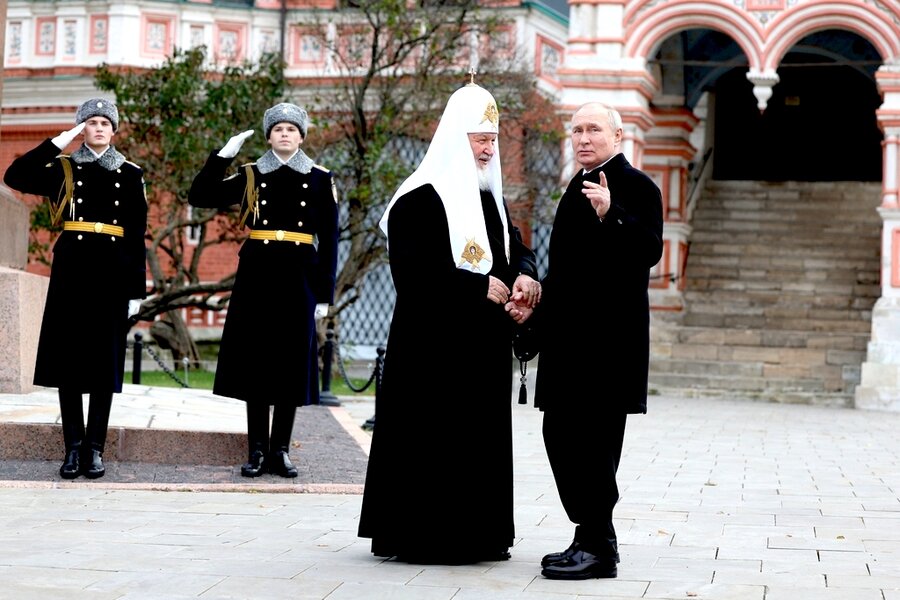Peacemakers and Putin’s holy war
Loading...
In a speech Tuesday, Russian President Vladimir Putin reminded the world that his war in Ukraine has a second front – one not defined by military conquest.
Speaking before a large group of clergy from the Russian Orthodox Church – and in front of images of Orthodox icons – Mr. Putin said Russian speakers everywhere constitute more than a nationality. Whether in Ukraine or elsewhere, they also have a “cultural, spiritual, and historical identity” as “part of the big Russian world.”
Mr. Putin’s speech reflects an acceleration of his attempts to justify the war as a “civilizational” cause, anchored by the central role of the Russian Orthodox Church as the traditional leader of many other Orthodox churches in former Soviet states. The Kremlin now speaks as much of a “holy war” as it does of patriotism.
Yet just as the Russian military has lost ground in Ukraine, so too is the Russian Orthodox Church losing the allegiance of Orthodox churches in neighboring countries from the Baltic states to Kazakhstan.
In Ukraine especially, many parishioners have switched to Orthodox churches not aligned with the one in Moscow, whose leaders back the war. A bill pending in the Ukrainian parliament would ban any religious group whose management is “located outside of Ukraine in a state that carries out armed aggression against Ukraine.”
Bulgaria has closed the Russian Orthodox Church for security reasons. In Kazakhstan, many Orthodox leaders are seeking official independence from the Moscow church. And in Moldova, a growing number of priests in the majority Russian-linked Orthodox church have asked it to switch allegiance to the Orthodox church in Romania.
“For our parishioners it is important to feel that we want peace and that the borders of all countries must be observed,” Moldovan President Maia Sandu told a radio interviewer. “The church cannot stay on the sidelines and pretend it does not see what is happening.”
Mr. Putin’s campaign to tie the war in Ukraine to the dominance of the Russian Orthodox Church could be more of a defensive move. Soon after the conflict started in early 2022, some 300 Russian Orthodox priests signed a public letter calling for peace in Ukraine. Several anti-war priests have been dismissed for their pacifist views. And Russian courts have convicted at least four people on criminal charges for opposing the war on religious grounds.
One of the most prominent anti-war priests is the Rev. Ioann Burdin in the Kostroma region northeast of Moscow. After being defrocked last March for his public prayers for peace, he told The Associated Press, “Since all people are brothers, then any war, any military conflict, one way or another becomes fratricidal.”
Another priest, Ioann Kurmoyarov, was sentenced in August to three years in prison for disseminating “false information” about the war effort. He told the court, “A Christian cannot look indifferently at the suffering of people, and especially children, regardless of what caused it.”
Perhaps such sentiments in Russia are why Mr. Putin, in his speech Tuesday, warned that “any attempt to sow ... religious discord, to split our society is betrayal, a crime against all of Russia.” Many Orthodox believers outside and inside Russia would beg to differ.







